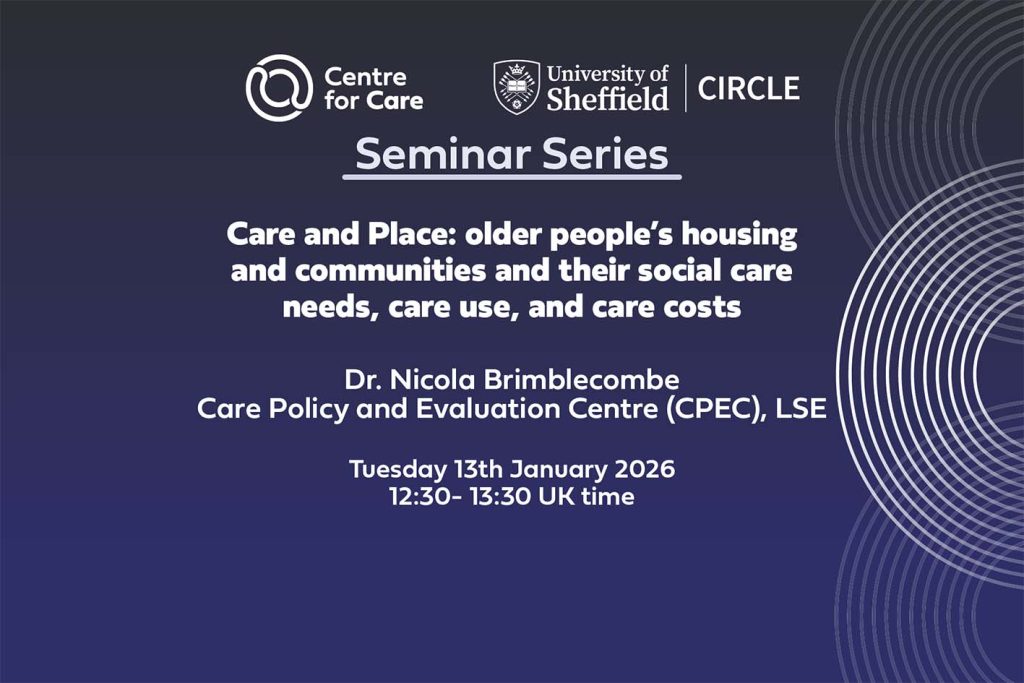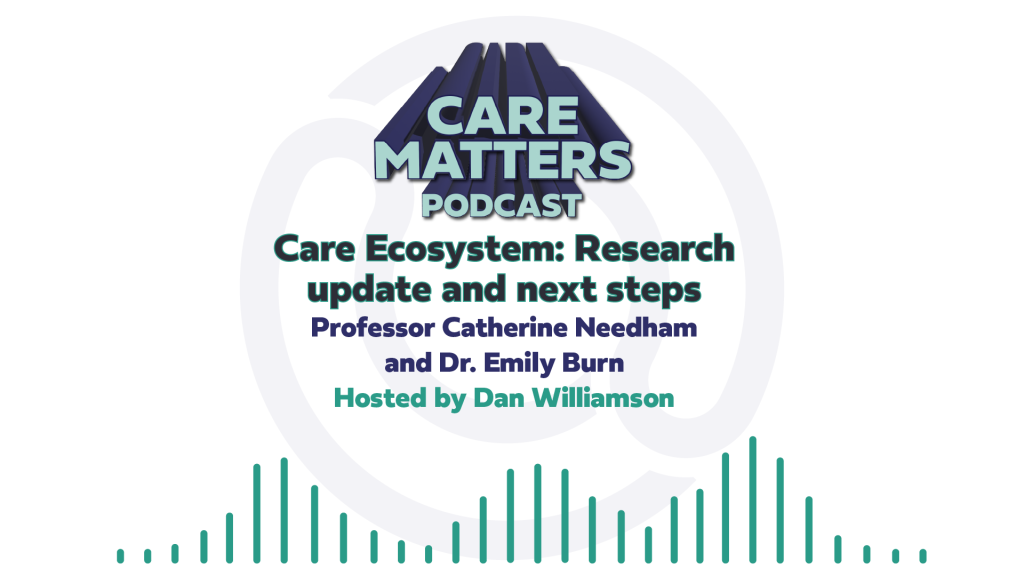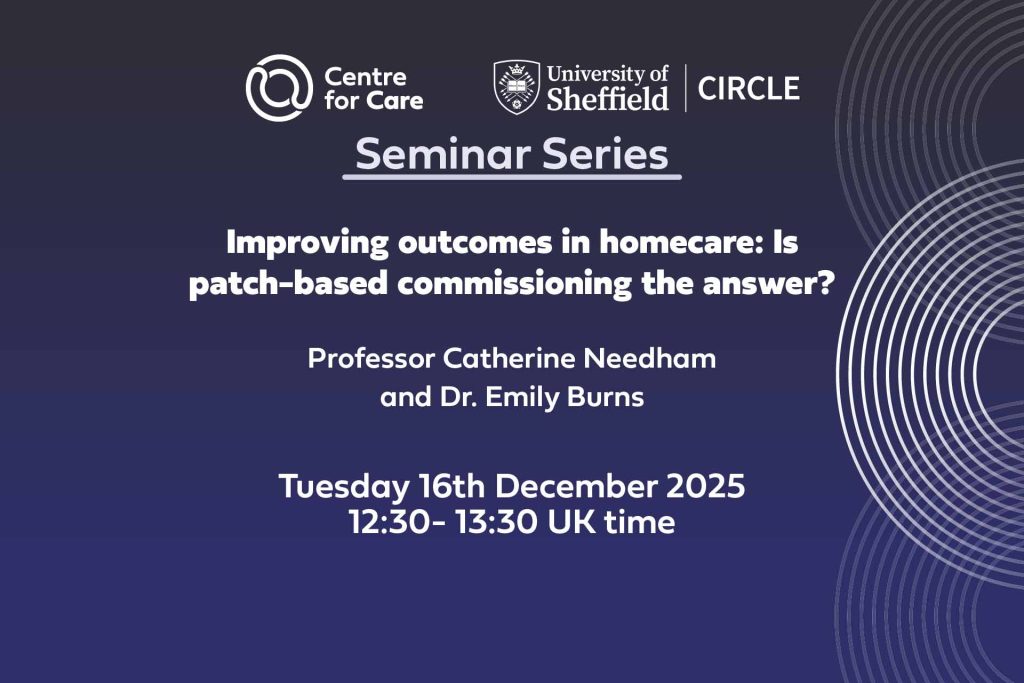
Care as a Complex, Adaptive Ecosystem
What makes social care a complex adaptive ecosystem and how can understanding this help improve care outcomes for all?
Viewing social care as an ecosystem means recognising it is a complex, adaptive, system, featuring ‘emergent’ outcomes (that are hard to control, but not random) and ‘episodic’ changes (responses to past events, internal ‘feedback loops’ and external ‘shocks’ that may lead to tipping points and change).
What’s distinctive about our approach?
- We focus on local level arrangements, recognising these are embedded in and linked to other systems.
- We focus on the wider support in people’s lives, not only publicly-funded, statutory services.
What are the advantages of a systems approach?
- In theory, systems adapt to their environment; if they can’t, in the end they cease to exist. Some variants of ‘best fit’ to current care ecosystem conditions may be ‘suboptimal’ for some groups. We explore who is affected and how this could change.
- A systems approach encourages experimentation and learning. Practitioners can be helped to work with complexity to deliver positive change, without feeling overwhelmed or disempowered.
- It can also foster new thinking about accountability and shift collective thinking away from feeling ‘nothing we can do can make the changes needed’.
Studying UK local and national systems, we focus on:
- Variations in local care ecosystem stability and effectiveness. We look at market stability, user outcomes, access to information and support, workforce retention, and ask, ‘Can we identify common system features that enable ‘best fit’ to support sustainability, equity and wellbeing?’. We focus on the recommissioning of homecare on a locality basis. Applying the ecosystem concept, we explore whether this approach improves the sustainability of homecare and the factors that support or inhibit the viability of locality-based commissioning approaches.
- Supporting local actors to shape their strategies, we use insights about complex adaptive systems to help those involved reduce tendencies to feel overwhelmed or fatalistic.
- Implementation of care legislation. New laws have often been poorly implemented. How can this be improved? Complexity insights highlight that policy implementation has to involve more than ‘pulling a lever’ and expecting change to happen.
A flourishing social care ecosystem
An ecosystem is a metaphor from nature which we often use in social science when talking about something which is complex and interlinked, and where no one is control of the whole thing.
Here we show our visual representation of a flourishing social care ecosystem, drawn by the artist Laura Brodrick (Home – Think Big Picture). It’s developed from the idea that a flourishing system has activity both above the soil line (visible) and below the soil line (invisible).
Things like care homes and hospitals are the visible part of the system – a bit like the mammals and birds that we see in nature. The invisible parts are all the small community activities which aren’t necessarily thought of as part of social care but are like the microorganisms that make the soil rich and fertile. These are the coffee mornings, choirs, sports clubs, dance groups, faith organisations, family and neighbourhood networks which help people to have purpose and meaning.
We need both the visible and the invisible for a flourishing social care ecosystem. When one part isn’t working well it overloads the other and we end up with a degraded ecosystem, like a barren landscape where nothing grows.
In our research for the Centre for Care we are looking at what characteristics of local social care ecosystems lead to flourishing. We explore whether the features of some local systems make them more likely to be degraded and failing, and how we can support flourishing everywhere.

Key outputs
Our key outputs so far include:
Conference papers
(presentation slides available by request, please contact us)
Needham, C. and Burn, E. (2023) ‘How can we study whole system reform in social care?’ Transforming Care Conference. University of Sheffield, 26-28 June.
Needham, C. and Burn, E. (2025) ‘Improving outcomes in homecare: Is patch-based commissioning the answer?’School for Social Care Research Conference. University of York, 20-21 May 2025.
Articles
Needham, C. and Burn, E. (2025) ‘Law but not law’: explaining unenacted policy as a type of policy failure. Policy & Politics, 53(2), 273-295. DOI: 10.1332/03055736Y2024D000000057
Book chapters
Burn. E. and Needham, C. (2025) ‘How Can Ecosystems Help Us to Make Sense of Complexity in Social Care?’ in R. Wilson, H. Hesselgreaves, M. French, M. Hawkins, D. Jamieson, M. King, J. Kimmitt (eds) Futures in Public Management: The Emerging Relational Approach to Public Services. Emerald Publishing Limited. Available at: https://doi.org/10.1108/978-1-83608-194-4 (Accessed: 25/11/2025)
Burn, E. and Needham, C. (2025) ‘Adult Social Care’ in S. Moralee, M. Sidhu, J. Smith and K. Walsh (eds) Healthcare Management. Fourth Edition. McGraw Hill. Available at: https://www.mheducation.co.uk/healthcare-management-4e-9780335252596-emea-group (Accessed: 25/11/2025)
Report
Needham, C. and Burn, E. (2023) What role for local government in Scotland’s National Care Service. Local Government Information Unit. Available at: https://lgiu.org/wp-content/uploads/2023/11/What-role-for-local-government-in-Scotlands-National-Care-Service.pdf (Accessed: 25/11/2025)
Podcast
Professor Catherine Needham and Dr. Emily Burn update us on the Care Ecosystem research so far, and what 2026 has in store:
Commentary and other outputs on Care as a Complex, Adaptive Ecosystem
Commentary pieces relating to Care as a Complex, Adaptive Ecosystem

We are very pleased to launch our new impact report today, ‘Towards a better future for care’.
Read More about Towards a better future for care: Centre for Care Impact report (November 2021-April 2025)
Seminar recording now available! We welcomed Dr. Nicola Brimblecombe to present ‘Care and Place: older people’s housing and communities and their social care needs, care use, and care costs’ on Tuesday 13th January 2026.
Read More about Seminar: Care and Place: older people’s housing and communities and their social care needs, care use, and care costs
Professor Catherine Needham and Dr. Emily Burn (Centre for Care, University of Birmingham) update us on the progress so far in their cross-cutting research theme at the Centre for Care, which looks at what makes social care a complex, adaptive ecosystem and how understanding this could help improve care outcomes for all. They reflect on […]
Read More about Podcast: Care Ecosystem: Research update and next steps
We welcomed Professor Catherine Needham and Dr. Emily Burn to present their research on 16th December 2025. Event recording now available.
Read More about Seminar: Professor Catherine Needham and Dr. Emily Burn
More publications
Members
The Care as a Complex, Adaptive Ecosystem team is led by Professor Catherine Needham at the University of Birmingham.

